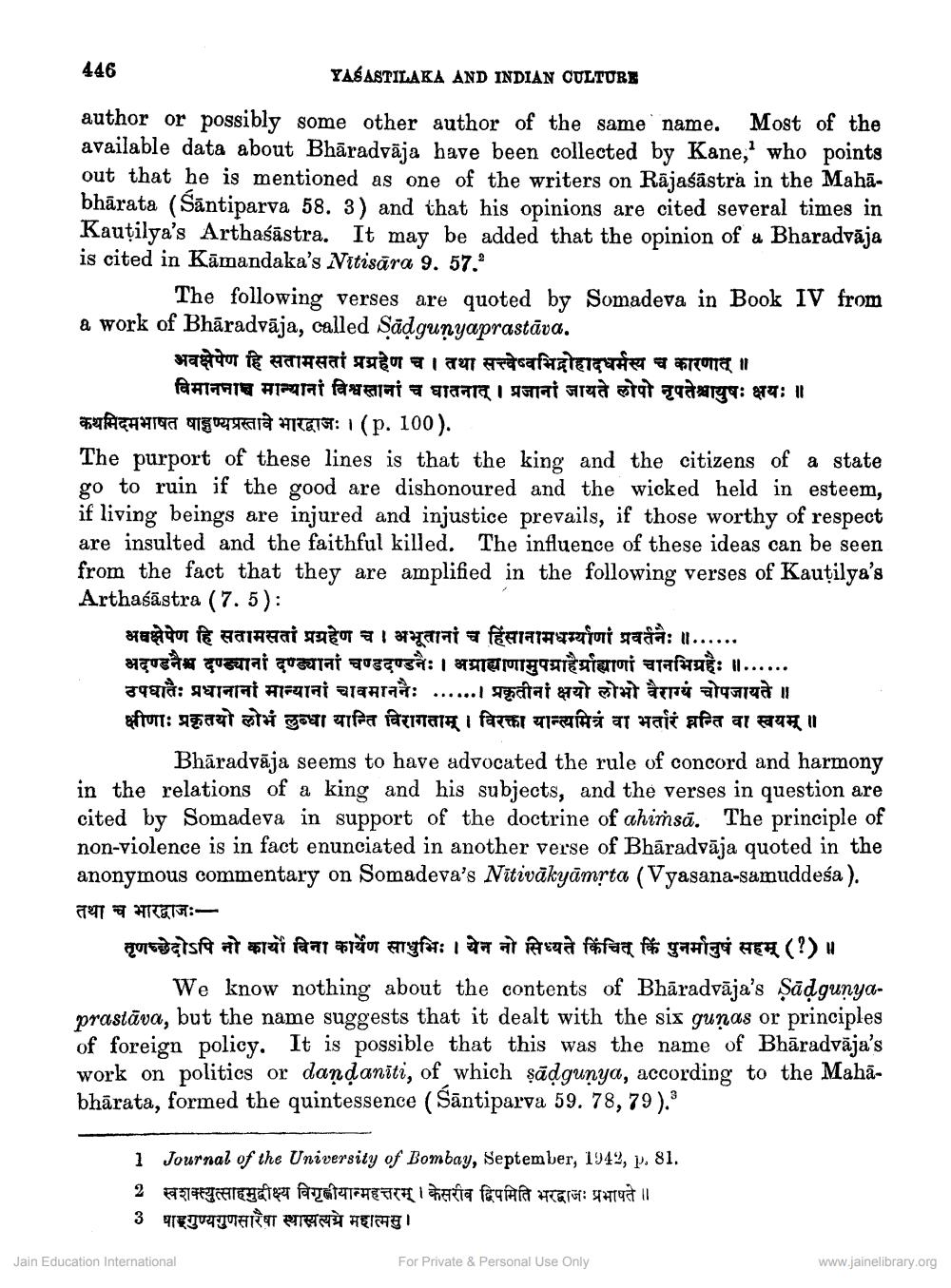________________
446
YASASTILAKA AND INDIAN CULTURE
author or possibly some other author of the same name. Most of the available data about Bhāradvāja have been collected by Kane,' who points out that he is mentioned as one of the writers on Rājaśāstra in the Mahābhārata (Santiparva. 58. 3) and that his opinions are cited several times in Kautilya's Arthaśāstra. It may be added that the opinion of a Bharadvāja is cited in Kāmandaka's Nitisāra 9. 57.
The following verses are quoted by Somadeva in Book IV from a work of Bhāradvāja, called Sadgunyaprastāva.
अवक्षेपेण हि सतामसतां प्रग्रहेण च । तथा सत्त्वेष्वभिदोहादधर्मस्य च कारणात् ॥
विमाननाच मान्यानां विश्वस्तानां च घातनात् । प्रजानां जायते लोपो नृपतेश्वायुषः क्षयः ॥ कथमिदमभाषत षाडण्यप्रस्तावे भारद्वाजः । (p. 100). The purport of these lines is that the king and the citizens of a state go to ruin if the good are dishonoured and the wicked held in esteem, if living beings are injured and injustice prevails, if those worthy of respect are insulted and the faithful killed. The influence of these ideas can be seen from the fact that they are amplified in the following verses of Kautilya's Arthaśāstra (7.5):
अवक्षेपेण हि सतामसतां प्रग्रहेण च । अभूतानां च हिंसानामधाणां प्रवर्तनैः ॥...... अदण्डनैश्च दण्ड्यानां दण्ड्यानां चण्डदण्डनैः । अग्राहाणामुपग्राहैह्याणां चानभिग्रहः ॥...... उपघातः प्रधानानां मान्यानां चावमाननैः ......। प्रकृतीनां क्षयो लोभो वैराग्यं चोपजायते ॥ क्षीणाः प्रकृतयो लोभं लुब्धा यान्ति विरागताम् । विरक्ता यान्त्यमित्रं वा भर्तारं नन्ति वा स्वयम् ॥
Bhāradvāja seems to have advocated the rule of concord and harmony in the relations of a king and his subjects, and the verses in question are cited by Somadeva in support of the doctrine of ahimsā. The principle of non-violence is in fact enunciated in another verse of Bhāradvāja quoted in the anonymous commentary on Somadeva's Nitivākyāmrta (Vyasana-samuddesa). तथा च भारद्वाजःतृणच्छेदोऽपि नो कार्यों विना कार्येण साधुभिः । येन नो सिध्यते किंचित् किं पुनर्मानुषं सहम् (?)॥
We know nothing about the contents of Bhāradvāja's Sadgunyaprastāva, but the name suggests that it dealt with the six gunas or principles of foreign policy. It is possible that this was the name of Bhāradvāja's work on politics or dandaniti, of which şādgunya, according to the Mahā. bharata, formed the quintessence (Santiparva. 59.78,79).३
1 Journal of the University of Bombay, September, 1942, p. 81. 2 स्वशक्त्युत्साहमुदीक्ष्य विगृह्णीयान्महत्तरम् । केसरीव द्विपमिति भरद्वाजः प्रभाषते ।। 3 पाइगुण्यगुणसारैषा स्थास्यत्यग्रे महात्मसु ।
Jain Education International
For Private & Personal Use Only
www.jainelibrary.org




